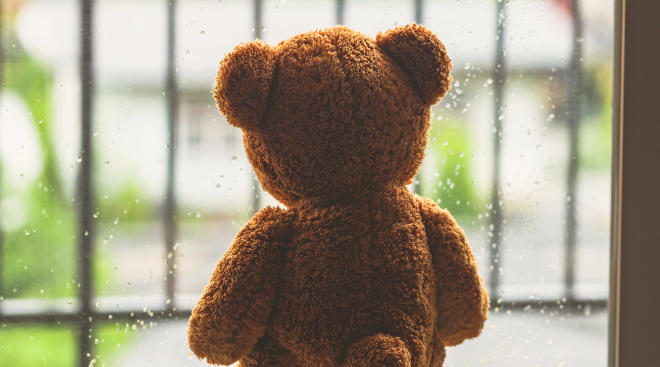Should Babies Get the Flu Shot? Here’s What to Know
When it comes to decisions about baby’s health and safety, as a parent you of course want to do your due diligence and make informed choices. So you’re not alone in wondering, should babies get the flu shot? Is it safe? The short answer is yes. Given their age, babies are more vulnerable to severe illness—but, fortunately, an infant flu shot can help keep them protected. Ready to get the lowdown on the flu shot for babies? We tapped two pediatricians to explain why they need it, common side effects to anticipate and tips to help make those dreaded but important vaccine appointments a little easier on you and your little one.
Officially called influenza, the flu refers to a group of respiratory viruses that circulate most widely during fall and winter. “It’s transmitted by respiratory droplets and from contact with contaminated surfaces,” explains Sydney Kometani, MD, a pediatrician at Austin’s First Steps, which is part of Pediatrix Medical Group. For the record: This doesn’t include the “stomach flu,” which is a phrase that usually refers to viral gastroenteritis, an infection of the digestive system that causes diarrhea and vomiting.
The flu is no fun for anyone, but it can be especially dangerous for babies. “The flu causes high fever, chills, body aches, headache, runny nose and cough,” says Kometani. These symptoms tend to be more severe with the flu than they’d be with a common cold—and while they can usually be managed at home, some children will require hospitalization due to complications. “Pneumonia, dehydration and brain infection called encephalitis are complications of influenza that children are at risk for,” says Molly O’Shea, MD, founder of Birmingham Pediatrics in Michigan. This may sound scary, but the reassuring news is that the flu vaccine can greatly reduce these risks.
The Centers for Disease Control and Prevention (CDC) recommends that everyone ages 6 months and up get vaccinated with the flu shot every year. The first time a baby gets the flu vaccine, they should receive two shots one month apart, according to O’Shea. (This two-shot series applies to any child up to 8 years old receiving the flu shot for the first time.) And, FYI, if they’re between 6 months and 8 years old and were previously vaccinated with only one dose, they should get two doses the next time they go for the annual vaccination.
Babies should get the flu shot well before seasonal cases begin to rise—ideally by the end of October, before flu season peaks (which is usually some time between December and late February). If you miss the fall window, it’s still worth getting your child their flu vaccine—even beyond January—since flu activity can continue as late as May.
The most obvious reason to get baby (and all children!) vaccinated is that the flu shot helps prevent influenza. Depending on the season and how well-matched the vaccine is to the virus strains circulating, it can reduce the risk of infection by 40 to 60 percent, according to the CDC. What’s more, in addition to helping prevent your child from catching the virus in the first place, being vaccinated lowers their risk of complications if they do get the flu. "The flu vaccine is very good at preventing severe disease, hospitalization and death,” says O’Shea. She adds that while it is possible for baby to be vaccinated and still get a mild case of flu, “vaccinated children are dramatically less likely to experience these complications.”
During the 2019 to 2020 flu season, the CDC estimates that 3.8 million children between ages of 0 and 4 contracted the flu and showed symptoms. Of these children, 27,340 were hospitalized and 347 died. Younger children are more at risk than their older peers for developing severe disease. The flu shot is especially important for children 6 months to 5 years, as they’re at higher risk of developing serious complications from the flu, says Kometani.
The science speaks for itself, and data strongly supports the benefits of vaccination. A study in the Journal of Infectious Diseases found that vaccinated children were 74 percent less likely to be admitted to a Pediatric Intensive Care Unit (PICU) for influenza than those who were unvaccinated. Another study in Pediatrics showed that the flu vaccine lowered the chance of death from flu by 51 percent in kids with high-risk conditions and by 65 percent among healthy children.
Yes, the flu shot is considered safe for all babies 6 months and older. The vaccine has been around since the 1940s; since then it’s been administered to hundreds of millions of Americans, and the extensive data available supports the safety of flu shots. Vaccines are thoroughly studied in clinical trials before coming to market, O’Shea explains, and are then monitored using the Vaccine Adverse Event Reporting System (VAERS), which is co-managed by the CDC and the Food & Drug Administration (FDA). “If a vaccine shows unusual or risky effects, it undergoes greater scrutiny,” she says.
A study published in the Journal of the Pediatric Infectious Diseases Society found the vaccine to be “well-tolerated” by most children, and that “serious adverse events are rarely reported, even in the youngest (6 to 23 months) children.” As O’Shea says, “The risks of the vaccine are miniscule for children. The risk of influenza, especially for infants, is not.”
If your child is allergic to eggs, you may be wondering if they can be vaccinated against the flu, since most flu shots and the nasal spray flu vaccine contain small amounts of egg proteins. According to the CDC, the answer is yes—people with a history of egg allergy of any severity should still get the flu shot, although it’s always best to talk to your pediatrician. "Egg allergy is no longer a contraindication to receiving the flu vaccine,” O’Shea says. “Kids with severe allergic reactions can consult their doctor, but most can just go ahead and get the vaccine.”
No one likes to see their little one in discomfort, but flu shot side effects in baby actually signal that their tiny body is doing what it’s supposed to do. "Getting any vaccine triggers your immune system to respond,” says O’Shea. “Depending on how rigorous that response is,” she explains, side effects may include:
- Fever
- Body aches
- Fussiness
- Redness where the shot is given
- Sore throat
- Runny nose
- Congestion
- Headache
Fortunately, all of these flu shot side effects typically go away after one or two days.
Baby fever after flu shot
Your pediatrician will probably give you the heads up that baby may develop a low-grade fever after receiving the flu shot. “Fever may be treated with acetaminophen or ibuprofen,” says Kometani. “For any high fever or excessive reaction, parents should follow up with their provider.”
Baby rash after flu shot
Parents may be alarmed to see their baby’s arm looking inflamed, but it’s usually no cause for concern. “Redness can be extensive at times with warmth and last for a couple of days,” says O’Shea. Remember, flu shot side effects in baby mean that their body is generating immunity. If it looks more like hives, contact your pediatrician to rule out a more serious allergic reaction.
Baby fussy after flu shot
Some fussing is par for the course after the flu shot. Baby may be sore or achy, and unlike an older child or adult, they don’t have the vocabulary to explicitly tell you how they’re feeling. Instead, they whine and act cranky. Some extra snuggles and a little bit of time and patience will help.
Rare reaction to flu shot in babies
A truly life-threatening reaction to the flu shot called anaphylaxis is extremely rare and tends to happen within minutes or hours of receiving the injection. Symptoms could include wheezing, trouble breathing, hives, paleness and weakness. “For any concerns with an anaphylactic reaction, parents should call 911,” says Kometani. A CDC Vaccine Safety Datalink study of the flu vaccine found only 10 cases of anaphylaxis after more than 7.4 million doses.
And, by the way, if your kiddo seems to glide through their flu shot experience completely unbothered, don’t worry. “Even without side effects, the vaccine is working,” O’Shea says.
As parents and caregivers, it’s natural to want to do everything to protect your little one and help them through the flu shot experience, which—let’s be honest—isn’t enjoyable for anyone. But staying calm and positive will set a great example, and being open about what’s going to happen at the doctor’s office helps manage expectations. “Parents can prepare their children for any shot by being supportive and honest about the importance of building immunity,” says Kometani. “The injection can be scary and hurt for a bit, but it’s offering great protection from a serious disease.”
Honesty may be the best policy, but babies won’t necessarily grasp the concept of taking proactive health steps. Fortunately, some simple soothing measures can go a long way. Ask your pediatrician if they’re comfortable with you providing distractions such as a bottle or pacifier while they administer the flu shot to baby. For toddlers and older kids, Kometani suggests asking about topical numbing cream (this gets applied ahead of time at home), or trying activities such as singing, listening to music or even blowing bubbles, which has the added benefit of helping kids slow down their breathing.
You may be wondering if you can proactively fend off some discomfort by giving your baby medicine like acetaminophen or ibuprofen before they get the flu shot. But these options should only be used after the shot as needed. “Giving acetaminophen or ibuprofen before the injection is no longer recommended because there are concerns it may affect the immune response,” says Kometani.
Finally, some parents love the idea of the nasal spray flu vaccine, which is approved for children older than 2, if they don’t have certain conditions. But many pediatricians advise against dodging the traditional injection. “The nasal spray version of the flu vaccine has been in and out of circulation due to its variable success rate with immune response,” says O’Shea. “Overall, getting the shot is a sure route to good immune response.”
Flu shots are safe for babies and it’s important to get them as soon as they’re eligible—and before flu season strikes. And while you’re at it, make an appointment for any olders kiddos and for yourself too! You can feel confident that you’re doing the wise thing to keep your family healthy and protected.
About the experts:
Sydney Kometani, MD, is a pediatrician at Austin’s First Steps, which is part of Pediatrix Medical Group. She received her medical degree at the John A. Burns School of Medicine in Honolulu, Hawaii, and completed her residency at the University of Texas Health Science Center at San Antonio.
Molly O’Shea, MD, is the founder and owner of Birmingham Pediatrics in Michigan. She is a former journal editor for the American Academy of Pediatrics as well as a former “Ask the Pediatrician” columnist in The Detroit News. She attended medical school at the University of Michigan and did her residency training at the Children’s Hospital of Michigan in Detroit.
Please note: The Bump and the materials and information it contains are not intended to, and do not constitute, medical or other health advice or diagnosis and should not be used as such. You should always consult with a qualified physician or health professional about your specific circumstances.
Plus, more from The Bump:
Navigate forward to interact with the calendar and select a date. Press the question mark key to get the keyboard shortcuts for changing dates.



















































